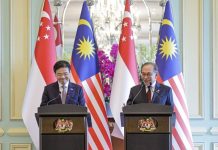MIDF Research forecasts Malaysia’s exports to contract in 2020
Malaysia’s exports is projected to further contract by 8.3 per cent this year compared to a negative 1.7 per cent growth last year amid the Covid-19 crisis, according to MIDF Research. It said Covid-19 has emerged as the top risk to global trade flows as it affects both supply and demand of goods. This includes Malaysia particularly with almost two months of the movement control order (MCO), which disrupted production and eventually exports.
“China’s latest external trade performances showed some improvement however the sustainability of it remains questionable at large. In addition, the re-escalation of US-China tension poses more threat to foreign trades. This will hinder most of the countries’ effort to restart their respective economies amid Covid-19 pandemic,” it said in a note today. MIDF Research said with one full month of MCO in April and conditional MCO in May, the country’s exports performance is expected to deteriorate in the second quarter of 2020.
Covid-19 has dragged Malaysia to record a trade deficit of RM3.5 billion in April 2020, after 269 consecutive months of surplus. The last trade deficit registered by the country was in October 1997 amounted to RM151.3 million.
The research house said the record deficit in April 2020 is expected to contribute negatively to Malaysia’s economic growth in the second quarter of 2020. It said during the month, export slumped to over 10-year low since September 2009, declining -23.8 per cent year-on-year, manifesting the impact of a full month of MCO.
Similarly, imports contracted by eight per cent year-on-year but at a far slower pace than exports mainly due to lumpy purchases of transport equipment particularly floating structures pertaining to Petronas Floating Liquefied Natural Gas 2 (PFLNG2). Meanwhile, imports of transport equipment soared by 232.7 per cent year-on-year during the month.
“As a result, Malaysia’s 269 consecutive months of trade surplus had shifted to a deficit of RM3.5 billion in April 2020. It is the largest trade deficit on record thus far,” it added. It said re-exports continued to record expansion in April 2029 at 38.2 per cent year-on-year, the highest since October 2018, mitigating the contraction in overall exports. The growth was driven by re-exports of electrical and electronic (+58 per cent) and petroleum products (+42.5 per cent). Re-exports of transport equipment growth, which jumped 530.9 per cent had also contributed to the surge as Malaysian carrier returned few units of aircraft to Indonesia.
The ratio of re-export to total export recorded at 28.7 per cent, the highest on record. “It simply means for every RM1 value of exports, approximately 29 sen of value is made up of re-export component. “On the other hand, domestic exports which involved high value-added activities declined to a record low of -35.4 per cent year-on-year, dragged down by deteriorating performances of commodity-based sectors and electrical & electronic,” MIDF Research noted.
Meanwhile, the Ministry of International Trade and Industry (MITI) said the Covid-19 pandemic has dragged Malaysia to record a trade deficit of RM3.5 billion in April 2020, after 269 consecutive months of surplus on account of higher contraction in exports compared to imports. MITI said during the reviewed month, exports contracted by 23.8 per cent to RM64.92 billion, while imports decreased by 8.0 per cent to RM68.42 billion. Total trade in April 2020 amounted to RM133.34 billion, a decrease of 16.4 per cent compared with April 2019 due to Covid-19 with lower trade recorded particularly with Singapore, Thailand, India, the United States (US), Japan, Vietnam and Saudi Arabia. On a monthly basis, trade and exports slipped by 9.9 per cent and 19 per cent respectively compared with March 2020, while imports increased by 0.9 per cent.
Commenting on the performance, Senior Minister and the International Trade and Industry Minister Datuk Seri Mohamed Azmin Ali said that the declines in both exports and imports were expected given that most countries around the world were under some form of lockdown to contain the spread of Covid-19. This has caused major disruptions to the manufacturing activities and movement of goods globally, he said. Nevertheless, exports of some products such as iron and steel, rubber gloves and refined palm oil recorded increases, he added.
“Malaysia’s exports are expected to improve in the coming months as the government allowed more industries to resume operations and at full operating capacity since May 4, 2020. “Similarly, companies in other countries are also ramping up their business operations. This will boost trade activities between Malaysia and other countries”, he added. MITI said the contraction of manufactured goods, which constituted 85.5 per cent of total exports, was due to lower exports of electrical and electronic products, manufactures of metal, machinery, equipment and parts, petroleum products as well as optical and scientific equipment, the Ministry said.
























